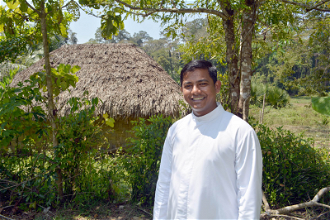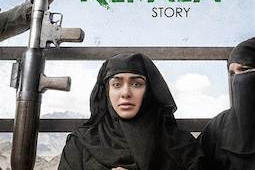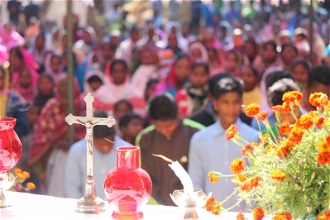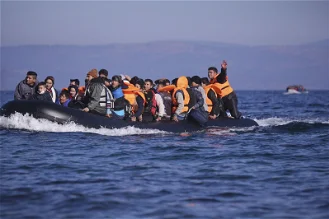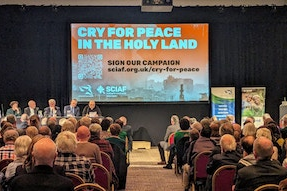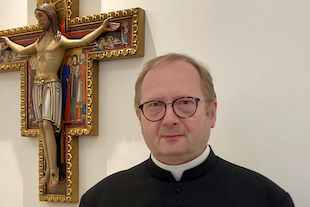India: Jesuits celebrate Human Fraternity Day

The Islamic Studies Association, Delhi and the Jesuit Secretariat for Service of Faith in South Asia jointly organized a series of webinars to celebrate Human Fraternity Day. Three leading international speakers - Professors Edward Joseph Alam (Notre Dame University, Beirut, Lebanon), Gabriel Said Reynolds (University of Notre Dame, Indiana, USA) and Christian S Krokus (University of Scranton, USA)- presented the webinars on the following themes: The Future of Christianity in West Asia (Lebanon and Syria): Fears and Hopes; The Biblical Material Present in the Qur'an: Perspectives for theological engagements with Islam; and Christian de Cherge: His Spirituality and its Relevance respectively.
Inspiration
Pope Francis and the Grand Imam of Al-Azhar signed Human Fraternity for World Peace and Living Together at Abh Dhabi. This important initiative for world peace marked the 800th anniversary of the meeting of St Francis with Sultan al-Malik al-Kamal. The Human Fraternity document invites Christians and Muslims to work for reconciliation and fraternity among all believers, indeed among believers and non-believers, and among all people of good will. A year later on 21 December 2021, the UN declared 4 February as the International Day of Human Fraternity. The UN General Assembly invited the Member States, the United Nations system and others to observe the annual day in a manner each considers appropriate to promote interreligious and intercultural dialogue. Taking inspiration from the teachings of Pope Francis and the Grand Imam of Al-Azhar and responding to the call of the UN, and to promote the spirit of reconciliation and fraternity among all men and women Islamic Studies Association, Delhi and Jesuit Secretariat for Service of Faith in South Asia organised this webinar.
Lebanon is an example of pluralism
Professor Edward Joseph Alam in his lecture The Future of Christianity in West Asia (Lebanon and Syria): Fears and Hopes pointed out that the dwindling number of Christians in Lebanon is an important issue that affects the confidence of Lebanese Christians. He clarified that migration of Christians out of Lebanon is not due to Islamic fundamentalism or terrorism alone as it appears to be, but rather primarily due to the lower birth rate among Christians and severe economic crisis that cripples Lebanon. The tensions and bloodshed between different religious groups accelerates this trend and destroys the solidarity between Lebanese people.
Speaking on the hopes, he said that there is a greater receptivity from and encouragement by the Islamic intellectuals to cultivate bonds of friendship between Christians and Muslims as they believe that the Christians can effectively play a mediating role in establishing peace, harmony and friendship between Shiite and Sunni Muslims. He stressed that the solidarity and brotherhood among the Abrahamic religion would facilitate Lebanon into a peaceful future of co-existence and harmony between diverse religious groups in Lebanon. It has been so in the past, we hope we shall walk forward to such coexistence in the future too is the hope of every Lebanese citizen, noted Professor Edward. He added that together as Christians and Muslims, recognising the Creator's profound gift; we could reorient ourselves in establishing right relationship with God, neighbour, creation. He concluded by stressing on the Lebanese vocation of unity with the words of John Paul II "Lebanon is more than a country. It is a message of freedom and an example of pluralism for East and West."
Qur'an alludes to the Biblical sources as it develops its unique religious message
Professor Gabriel Said Reynolds in his lecture The Biblical Material Present in the Qur'an: Perspectives for theological engagements with Islam presented in broad strokes a portrait of Qur'anic Studies done by the Orientalists of the past. He said that the European scholarship on the Qur'an assumed the link between the Qur'an and the biography of the prophet Muhammad. Accordingly, scholars began to match individual passages of the Qur'an with the biography of the prophet. In contrast to this position the Jesuit scholar Henri Lammens argued that the sira is the product of the exegesis of the Qur'an and therefore it cannot be used to explain the Qur'an.
Professor Reynolds also pointed out that many Christian and Jewish scholars tried to claim that Islam is systemically related to their religion. While scholars like W Rudolph, R Bell, T Andrae, and JS Trimingham argued for what they believed was a dominant Christian influence on the Qur'an, others like R Dozy, A Geiger, D. Sidersky, CC Torrey, A Katsh, A. Zaoui and J Bouman alleged the Jewish influence on it. However many scholars like WM Watt and M Gaudefroy-Demomlyness and HAR Gibb do not agree with any such view and have claimed that Islam grew out of an Arabic background without any influence from Judaism and Christianity.
In the context of Qur'anic studies, Professor Reynolds argues that the Qur'an alludes to the Biblical sources but do not quote from them. Qur'an alludes to the Biblical sources as it develops its unique religious message. He names this conversation between the Qur'an and the Biblical literary context as conversation with the Biblical subtext. His scholarly approach is not to identify the source of the Qur'an, but a study of the Qur'an animated by its allusion to, interpretation of its literary context. Professor Reynolds does not ask theological questions about the Quran and Muhammad. In his research he restricts himself to a discussion of the history of ideas and texts.
Christian de Cherge: His Spirituality and its Relevance was the third and final webinar on the series. Christian de Chergé was the prior of the Cistercian community at Tibhirine, Algeria, who was assassinated with six of his fellow monks in 1996 during the civil war that engulfed Algeria. On 8 December 2018, in Oran, the Catholic Church beatified these seven French monks and 12 other Catholics killed during the civil war. Professor Christian Krokus reminded that, prior to the beatification ceremony; both Christians and Muslims honoured the memory of 114 Muslim Imams who were also killed during the civil war. Many Muslims from Sufi Muslim fraternities participated in the beatification ceremony.
Christian de Cherge saw his Muslim neighbours through the optics of God, Abba Father since he held that God of Islam and God of Jesus Christ is the One God whom Jesus addressed as Abba Father. He recognised in his Muslim neighbours the feature of his heavenly Father. He, instead of asking, 'how do Muslims fit into the salvation history?' asked, 'how do Christians and Muslims fit into the salvation history that God unfolded in Christ in the power of the Spirit?' This question of de Cherge was born of his deep understanding of his monastic vocation as a call to be a person of prayer among persons who pray, that is, among the Muslim friends and neighbours with whom he and his brothers shared their daily lives. Professor Christian pointed out that de Cherge read the Qur'an using the method of 'Lectio Divina' and thus allowed the Qur'an to speak for itself.
Professor Christian commenting on the spirituality of de Cherge further said that Hope is not just the human assumption or expectation that things will one day be restored to their former state. Rather, hope is the confidence that God's promise points to a future that is beyond human expectations. De Cherge and his companions lived in solidarity with their Muslim brothers and sisters; they gave witness to the conviction that God had made irrevocable promises to all men and women in many different ways through his Prophets. In other words, in the vision of Christian de Cherge, Christians and Muslims are united in the bosom of God, the Father. It is a beautiful theological vision for Christian Muslim Relations.
Engaging conversations followed every lecture. It was a theological treat for me, said one of the students of theology who attended the program. This webinar series helped me to recognise the importance of the theological foundations for dialogue, said another participant.



